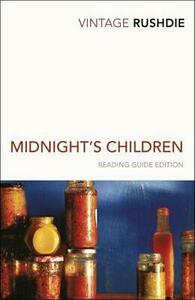You need to sign in or sign up before continuing.
Take a photo of a barcode or cover
Beginning a book by Rushdie requires an adjustment period. His paragraphs are streams of description that are so loud, intricate, and vibrant you forget the piece of the plot you were meant to notice. The focus of midnight's children is so compelling that once you've adjusted to the world of smells and holes you don't really care to leave.
A monumental novel that’s a family saga linked to the history of independent India but also (forgive me the cliché Saleem) so much more.
There’s allegory, allusion, recurrences, and logic. The logic – the magic/supernatural connections between characters born at the time of independence and the life of the country that started that day – is just so enjoyable and makes the mysterious coherent. Myth is a major theme. The subjectivity of the fictional author and metatextuality is hugely important. And I think I’ve barely scratched the surface of interesting things to say about Midnight’s Children.
I worried the sheer weight of the accumulated narrative would be too much by the end but the finale is wonderful and resolves as neatly as all the preceding episodes do.
This was published the year I was born which I find pretty funny…
There’s allegory, allusion, recurrences, and logic. The logic – the magic/supernatural connections between characters born at the time of independence and the life of the country that started that day – is just so enjoyable and makes the mysterious coherent. Myth is a major theme. The subjectivity of the fictional author and metatextuality is hugely important. And I think I’ve barely scratched the surface of interesting things to say about Midnight’s Children.
I worried the sheer weight of the accumulated narrative would be too much by the end but the finale is wonderful and resolves as neatly as all the preceding episodes do.
This was published the year I was born which I find pretty funny…
Often brilliant. Only the slow war chapters at the start of book three kept me from giving it 5 stars.
challenging
slow-paced
The BBC audiobook presentation of this classic was very good. In his interview at the end, Rushdie states that anyone who goes to India remarks on the crowdedness of so many people. He indicates that he tried to get that feeling across by having so many characters with their various story lines and having the main storyline fighting its way through . That helped explain why I was sometimes confused, before getting straightened out again. I think if I was reading text, I could have gone back to check, but the dramatics were fabulous!
Rushdie’s unruly 1981 masterpiece redrew India’s literary map—tossing E.M. Forster’s colonialism into the ash heaps. With echoes of “One Hundred Years of Solitude,” “Midnight” is alive with history, fantasy & chaos. Its absurdist narrator is born at the second of independence—& dreams he controls the tragic, sometimes farcical events inflaming his country’s adolescence. (Do we make history or does it make us?) Dense & overflowing with voices, it rewards you for reading slowly. Rushdie says he doesn’t recognize India today—gripped by authoritarianism & religious fanaticism. He would know. “Right now, in India, it’s midnight again.”
I started digging on MC more once I picked up on the parallels with Tristram Shandy. MC has much more of the exciting fleeing-from-death bits and less of the boring middle (although there was still some boring middle, and I almost quit reading because of it). Not sure how I feel about the unreliable narrator - I don't want him too honest, but patently insane is no fun, either. I like him best when Padma is keeping him on the rails.
challenging
emotional
funny
informative
mysterious
reflective
slow-paced
Plot or Character Driven:
Character
Strong character development:
Yes
Loveable characters:
Yes
Diverse cast of characters:
Yes
Flaws of characters a main focus:
Yes
There's quite a bit to digest in this book. It's very bound up in the story of India's independence and the partition of India and Pakistan, of which I have only a cursory historical knowledge. I do think that Rushdie does a good job of making it clear which parts are historical and which parts are invented for the most part, but without the requisite background knowledge I did have to guess a few times. The nuances of the politics went completely over my head. I'd be interested in pairing this with a nonfiction book that goes over some of the historical events that this book runs in parallel with.
The writing style is overwrought, but that does match with the narrator's perception of his own story--it's not distracting, but it is a way to characterize the narrator. While the events are presented in chronological order, more or less, the framing device of the narrator recounting his story to a companion means that he's often alluding to future events, foreshadowing in a way that feels natural and conversational.
The writing style is overwrought, but that does match with the narrator's perception of his own story--it's not distracting, but it is a way to characterize the narrator. While the events are presented in chronological order, more or less, the framing device of the narrator recounting his story to a companion means that he's often alluding to future events, foreshadowing in a way that feels natural and conversational.
slow-paced





